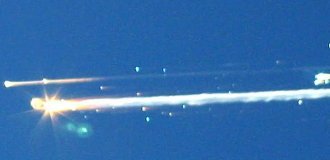The Universe is so huge that even knowing the approximate numbers, it is impossible to imagine its size. That is why the Universe never ceases to amaze us with its beauty and new mysteries. Scientists are constantly conducting new research so that we can learn as much as possible about the Universe, and here are 10 of the most amazing and incredible facts. 
10. Our bodies are made of stars 
Your and every other body in the Universe consists of stars, or rather, dead stars. In the beginning, only simple elements such as hydrogen and helium existed. These elements then combined to form the first stars, which in turn formed new elements such as iron and gold. After some time, the first stars died, and their explosions formed new elements. Our bodies are made up of almost every element in the universe - of course, the majority are elements like hydrogen and oxygen, but we also contain small amounts of elements like gold!
9. When you look at the sky, you are looking into the past. 
The stars you see are not stars at all, but the light they emitted many years ago. Because light takes a certain time to reach us, we see it as it was some time ago. One light year is the distance that light travels in a year. So if you look at a star that is 1000 light years away, you see it as it looked 1000 years ago.
8. Scientists are searching for extraterrestrial life 
Scientists are so interested in alien life that they have come up with dozens of different interesting techniques aimed at searching for it. For example, the SETI (Search for Extraterrestrial Intelligence) project, in order to speed up the detection of aliens, uses its methods to search for space debris, nearby stars, artificial objects, radio waves and radiation.
7. There are at least 10 billion trillion stars in the Universe 
Although scientists cannot agree on this issue, the most reliable figure we have is 10 billion trillion. Each star varies in size and can be hundreds of times smaller or larger than our Sun. In addition, each star is surrounded by stellar bodies, like planets, of which there can be from 4 to 12.
6. Scientists think we might be aliens ourselves 
Some scientists believe that simple microorganisms like bacteria formed on Mars and, as a result of a meteorite fall, ended up on Earth at an early stage of its formation. From that point on, we began to evolve into more complex organisms and many years later evolved into the human beings we are today. It sounds crazy, but at that time the atmosphere on Mars could have been much more suitable for life. This means that there is a chance that we and many other species known to us are aliens who colonized the Earth.
5. There could be more universes 
Yes, our Universe may be just one of many others different from ours. The slightest changes in the principles of science can transform other Universes into something we have never even dreamed of. It all depends on the fact whether the big bang that started our universe could happen in other places. If so, then the existence of countless other worlds is indeed possible.
4. Black holes die too 
Black holes are bodies of various sizes that we cannot see. They have an incredible gravitational force that even light cannot overcome, and they feed on captured light to survive. However, Stephen Hawking argues that if black holes starve for too long, they may die after some time.
3. The universe is growing 
Until the 1920s, people believed that the universe was standing still, but astronomer Edwin Hubble discovered that it was expanding. For years, people have been wrong about the assumption that gravity slows down the universe, but that fact would only be true if gravity were stronger. Moreover, in 1998, the Hubble telescope recorded that supernovae in the pastexpanded more slowly than now, which only confirms Hubble's theory.
2. The universe is full of invisible things 
There is an opinion that we see and know only 4% of the Universe, since 96% may consist of dark matter and dark energy that we still cannot detect. These unknown entities are believed to be pushing apart visible matter, leading to the expansion of the Universe and other possible effects that are not yet known to us.
1. Our ancestors knew more about the Universe than we know now 
Our ancestors were much smarter than many people think. Although they didn't build skyscrapers or create computers, they knew a lot about plants and herbs, geography and astronomy. Let's not forget Stonehenge, the Pyramids of Giza, the Nazca Lines, and hundreds of other famous sites that our ancestors supposedly used to observe the skies. They believed that changes in the sky played a big role in their lives, so they made accurate cosmological calculations. The information they gained helped them determine when it was best to grow food, travel to dangerous lands, form alliances, and make important decisions.
Add your comment
You might be interested in:





















